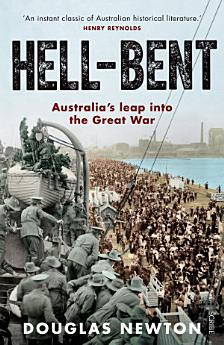Hell-Bent: Australia’s leap into the Great War
About this ebook
London’s choice for war was a very close-run thing. At the height of the diplomatic crisis leading to war, it looked very much like Britain would choose neutrality. Only very late in the evening of Tuesday 4 August did a small clique in the British cabinet finally engineer a declaration of war against Germany.
Meanwhile, Australia’s political leaders, deep in the throes of a federal election campaign, competed with each other in a love-of-empire auction. They leapt ahead of events in London. At the height of the diplomatic crisis, they offered to transfer the brand-new Royal Australian Navy to the British Admiralty. Most importantly, on Monday 3 August, an inner group of the Australian cabinet, egged on by the governor-general, offered an expeditionary force of 20,000 men, to serve anywhere, for any objective, under British command, and with the whole cost to be borne by Australia — some forty hours before the British cabinet made up its mind.
Australia’s leaders thereby lost the chance to set limits, to weigh objectives, or to insist upon consultation. They needlessly exposed Australian soldiers and their families to the full horror of the mechanised slaughter that was to come. They were hell-bent — and they got there.
Ratings and reviews
- Flag inappropriate
About the author
Douglas Newton was born in Sydney in 1952 and is a retired academic, having taught European history at the Victoria University of Wellington, New Zealand, in 1986–90, and at the University of Western Sydney for the following eighteen years. His special interests are peace and war in the period 1890–1919. He has published academic studies of the peace movement before 1914, the peacemaking of 1918–1919, and Germany in the period of Weimar and Nazism, and is currently preparing a history of the struggle for a negotiated peace during the Great War. He lives in Sydney.




